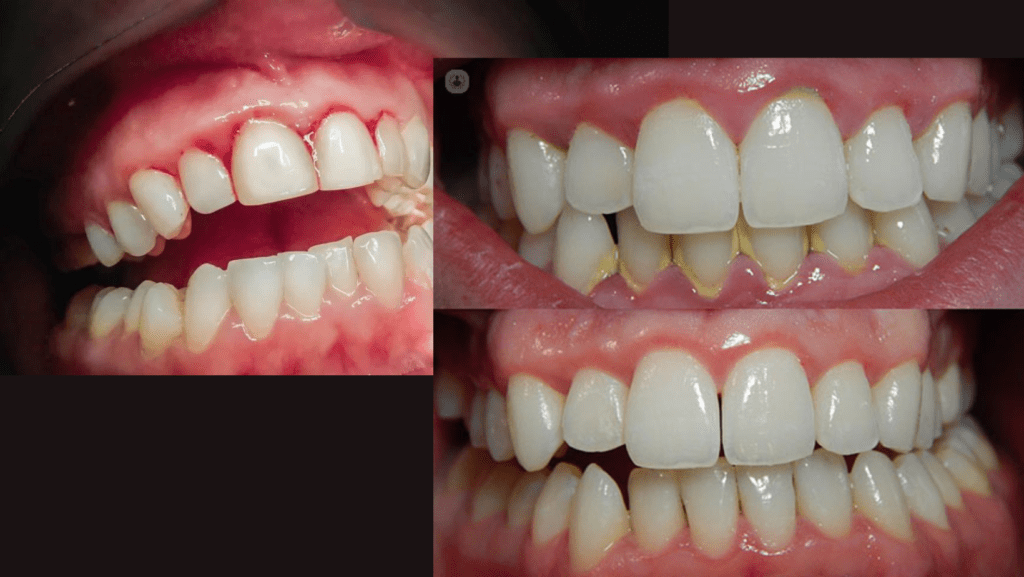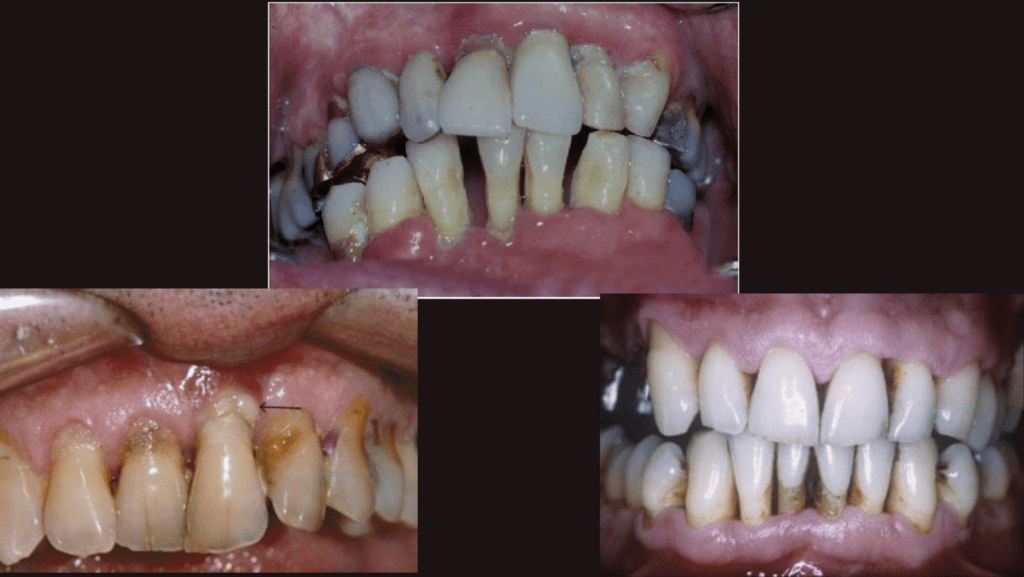Gum disease, also known as periodontal disease, is a serious infection that attacks the tissues and bones supporting your teeth. It’s the leading cause of adult tooth loss, affecting millions of people worldwide.
If you’ve suffered tooth loss due to gum disease, false teeth, like dentures or implants, can be a great option to restore your smile and chewing function. But can you wear false teeth if you still have gum disease?
Table of Contents
What is Gum Disease?
Understanding gum disease, also known as periodontal disease, is crucial before discussing dentures. It starts with a mild infection in the gums caused by plaque buildup. If left untreated, this plaque hardens into tartar, allowing the infection to progress deeper. In its early stage, called gingivitis, the gums become inflamed and may bleed easily.
As gum disease advances to periodontitis, it damages the bone and ligaments that hold our teeth in place. This can lead to loose teeth and eventually, tooth loss, affecting millions of people worldwide and ranking as the leading cause of adult tooth loss.
Stages of Gum Disease
Gum disease doesn’t happen overnight. It progresses through distinct stages, each with its own set of signs and symptoms:
Gingivitis:
The underlying threat behind red, swollen, and tender gums might not be as alarming as it seems. This initial stage of gum disease, called gingivitis, is caused by a buildup of plaque and bacteria at the gum line. The good news? Gingivitis is entirely reversible with good oral hygiene.
By stepping up your brushing and flossing routine, along with regular professional cleanings, you can banish the plaque and prevent it from progressing into a more damaging form of gum disease.

Periodontitis:
While gingivitis is the initial warning sign, if left untreated, it can morph into the more severe stage known as periodontitis. This advance gum disease signifies a deeper infection that attacks the very foundation of your smile – the bone, ligaments, and tissues supporting your teeth.
Symptoms like persistent bad breath, receding gums, and loose teeth become more evident. In some cases, pockets of pus may form around the teeth, indicating a significant infection. The worst-case scenario? Teeth become increasingly loose and may eventually fall out, requiring extraction to prevent further complications.
Periodontitis is a serious condition, but with early intervention and proper dental care, you can prevent its progression and safeguard your oral health.

What are False Teeth?
There are two main types of false teeth used to replace missing teeth:
Dentures:
Missing teeth can impact your ability to chew, speak, and even your confidence. Dentures offer a reliable solution in such cases. These removable appliances come in full sets to replace all teeth in an arch or partial sets to fill in specific gaps.
Made to fit snugly over your gums, dentures improve your smile and chewing ability. While they may require adhesives for additional stability, dentures are a practical and time-tested way to restore both function and aesthetics when missing teeth become a concern.
Dental Implants:
Unlike traditional replacements like dentures, dental implants offer a permanent solution for missing teeth. These surgically placed posts, typically made of titanium, act as artificial tooth roots.
Anchored securely in the jawbone, they provide a strong foundation for crowns, bridges, or even implant-supported dentures. This unique approach eliminates the need for adhesives or the discomfort associated with removable options, allowing you to enjoy a natural look, feel, and function.
Can You Get False Teeth with Gum Disease?
Whether you can get false teeth depends on the severity of your gum disease:
For Mild Gingivitis:
While dentures and implants are excellent options for replacing missing teeth, they shouldn’t be the first course of action, especially if you’re experiencing early-stage gum disease (gingivitis). Here’s why: a healthy foundation is crucial for the long-term success of any dental restoration.
Gum disease, if left untreated, can lead to further bone loss, making it difficult to properly fit dentures or support implants. The good news is that gingivitis is often reversible. By visiting your dentist for a thorough cleaning, including scaling and root planing to remove plaque and tartar buildup, you can halt the progression of the disease and create a strong, healthy base for your natural teeth.
This proactive approach can not only prevent the need for false teeth in the future but also safeguard your overall oral health. Treat gum disease now for a smile that lasts a lifetime.
For Moderate to Advanced Periodontitis:
For moderate to advanced periodontitis, also known as advanced gum disease, treatment becomes more complex. Your dentist will thoroughly assess the situation, including the amount of bone loss around your remaining healthy teeth.
In some cases, tooth extraction may be necessary to prevent further damage and prepare the mouth for dentures. However, if you have significant bone loss, traditional dentures may not be the most suitable option.
Here, implant-supported dentures come into play. These dentures use implants, which are surgically placed in the jawbone, to provide sufficient bone support and a secure fit for the dentures. In some instances, additional bone grafting procedures may be required to create a strong foundation for the implants.
Why Gum Disease Needs Attention Before False Teeth
Here’s why treating gum disease is essential before getting false teeth:
Worsening Gum Disease:
Ignoring gum disease can set off a vicious cycle that significantly complicates getting dentures. Inflammation from the disease can irritate your gums, making it uncomfortable to wear dentures. In severe cases, bone loss can occur, affecting the fit and stability of your dentures.
Loose dentures rubbing against inflamed gums can then further worsen gum disease, creating a cycle of discomfort. Therefore, addressing gum disease before considering dentures is crucial for long-term oral health and a successful denture experience.
Increased Risk of Implant Failure:
While dental implants offer a fantastic solution for replacing missing teeth, their success relies heavily on a healthy foundation – your jawbone. Active gum disease, characterized by inflammation and infection caused by bacteria, can significantly jeopardize the implant site.
Unchecked gum disease allows harmful bacteria to proliferate, increasing the risk of infection around the implant. This not only compromises the successful integration of the implant with the jawbone (osseointegration) but can also lead to bone loss, ultimately increasing the risk of implant failure.
Maintaining Oral Health with False Teeth
Having false teeth doesn’t mean neglecting your oral hygiene. Here’s how to care for your mouth and keep your smile healthy:
Regular Cleanings:
Maintaining a sparkling smile isn’t just about your teeth anymore! For those with dentures, daily cleaning is crucial to prevent the buildup of plaque and bacteria. Following your dentist’s instructions, use a soft-bristled brush and a non-abrasive denture cleanser to gently scrub all surfaces, removing food particles and stopping the growth of bacteria that can contribute to bad breath and even gum disease.
Don’t forget your gums and tongue! Brushing your tongue helps remove lingering bacteria and keeps your breath fresh.
Dental Visits:
Maintaining oral health with dentures isn’t just about brushing – regular checkups with your dentist are crucial.
Denture adjustments and relines, recommended by your dentist during checkups, ensure a proper fit that protects your gums and keeps your smile healthy. This focus on fit goes beyond comfort; it safeguards your oral health for the long term.
Healthy Diet:
Maintaining a healthy diet isn’t just about enjoying delicious meals, it’s a cornerstone for overall health, including your smile! When you have false teeth, choosing nutrient-rich foods becomes even more important.
A diet packed with fruits, vegetables, and whole grains provides essential vitamins and minerals that support gum tissues and promote a healthy mouth. Limiting sugary drinks and processed foods helps curb plaque buildup, keeping your smile bright and your dentures secure.
Conclusion
While gum disease, a leading cause of adult tooth loss, can threaten your healthy smile, it doesn’t necessarily have to dash your dreams of restoring it with false teeth. Dentures and implants are both options for replacing missing teeth, but prioritizing gum disease treatment is key.
Early gum disease, gingivitis, can often be reversed with a professional cleaning and improved oral hygiene practices. However, in advanced stages, tooth extraction may be necessary to control the infection and prevent further bone loss. Here, the decision between dentures and implants depends on the severity of bone loss.
Implants require sufficient healthy bone for successful placement, and in some cases, bone grafting may be needed before implant surgery. While dentures can be a good option even with bone loss, they may not offer the same chewing function and stability as implants.
Ultimately, the best course of action depends on your individual situation. Discuss your options with your dentist to create a personalized plan focused on treating gum disease, preserving your remaining teeth, and restoring your smile. With a proactive approach that combines good oral hygiene practices, daily denture cleaning, and regular dental visits, you can achieve long-term success with false teeth, even if gum disease is in the picture.
Check similiar guide: Does Flossing Help Whiten Teeth?
Frequently asked Queestions
I have gum disease. Can I still get dentures?
It depends on the severity of your gum disease. If you have mild gingivitis, you can likely get dentures after treatment with professional cleaning (scaling and root planing). However, for moderate to advanced gum disease (periodontitis), your dentist will assess bone loss and remaining teeth. Extractions might be needed before dentures, or bone grafting procedures for implant-supported dentures.
Will dentures worsen my gum disease?
Untreated gum disease can worsen with dentures. Poorly fitting dentures can irritate the gums, and plaque buildup underneath can accelerate bone loss. Regular cleaning of dentures and maintaining good oral hygiene are crucial.
Are implants an option with gum disease?
Dental implants rely on healthy bone for successful integration. Active gum disease increases the risk of implant failure due to bacterial infection. Treating gum disease is essential before considering implants.
What are the different types of dentures?
There are two main types: full dentures replace all teeth in an arch (upper or lower), while partial dentures fill gaps left by missing teeth. Implant-supported dentures are another option, using implants for added stability.
How long do dentures typically last?
Dentures can last 5-10 years with proper care. Over time, the jawbone and gums can change, affecting the fit. Regular dental checkups are necessary to ensure proper fit and prevent discomfort.
How do I take care of dentures?
Clean your dentures daily with a soft-bristled brush and non-abrasive denture cleanser. Brush your gums and tongue to remove plaque. Soak your dentures overnight in a denture cleaning solution.
How do implants differ from dentures?
Implants are surgically placed anchors in the jawbone that act as artificial tooth roots. They support crowns, bridges, or implant-supported dentures. Implants offer a more permanent solution compared to removable dentures.
Are implants painful to get?
Local anesthesia is used during implant surgery to minimize discomfort. You might experience some soreness or swelling after the procedure, but pain medication can help manage it.
How much do false teeth cost?
Costs vary depending on the type of false teeth, materials used, and the complexity of your case. Dentures are generally less expensive than implants. Consult your dentist for a cost estimate.
